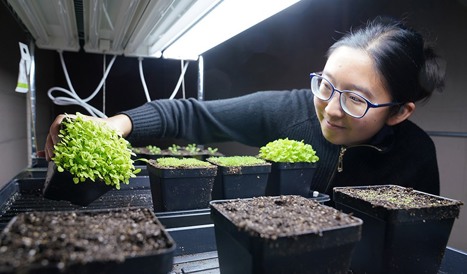
The National Science Foundation has granted Purdue University $1.1 million to fund research on how plants adapt to environmental stress. Associate professor Gyeong Mee Yoon will be investigating the molecular responses of plants to stressors such as drought, severe heat, and cold. By examining the biosynthesis and signaling of the ethylene hormone and studying the role of autophagy, Yoon hopes to uncover the connection between these two pathways and their impact on plant growth and stress tolerance. This research has significant implications for food security in the face of climate change. In addition to her scientific work, Yoon is committed to inspiring and educating the next generation of scientists through outreach programs for undergraduate and high school students.
$1.1 million grant awarded to Purdue University for research on molecular response of plants to environmental stress

Introduction
Purdue University’s Gyeong Mee Yoon has received a $1.1 million grant from the National Science Foundation to conduct research on how plants adapt to environmental stress. This research aims to uncover the molecular response of plants to stresses such as drought, severe heat, and cold, and could have significant implications for food security in the face of climate change.
Researcher receives grant from National Science Foundation
Gyeong Mee Yoon, an associate professor of botany and plant pathology at Purdue University, has been awarded a $1.1 million grant from the National Science Foundation. This grant will fund her research on the molecular response of plants to environmental stress and explore the mechanisms through which plants acclimate to these stressful conditions.
Purpose of the research
The purpose of this research is to gain a better understanding of how plants respond to environmental stress and identify the biochemical pathways involved in their adaptation. By studying the molecular response of plants, researchers hope to uncover mechanisms that can be harnessed to develop stress-tolerant, high-yield, and pathogen-resistant plants.

Investigating two biochemical pathways
In her research, Gyeong Mee Yoon is investigating two different biochemical pathways that plants use to improve their response to environmental stress. These pathways include the biosynthesis and signaling of the ethylene hormone and the role of autophagy, a process in which plants and animals consume themselves to replace lost nutrients during stressful conditions.
Biochemistry and signaling of the ethylene hormone
The ethylene hormone is well-known for its role in regulating fruit ripening, but it also plays a critical role in how plants respond to stress. Gyeong Mee Yoon’s research aims to uncover the biochemistry and signaling pathways of ethylene and understand how it helps plants adjust their growth and cellular energy levels in response to environmental stress.
Role of autophagy in plant response to stress
Autophagy is another well-known process in which plants and animals consume themselves to replace lost nutrients during stressful conditions. Gyeong Mee Yoon’s research also investigates the role of autophagy in the plant’s response to stress. By understanding how autophagy is involved in stress response, researchers can uncover additional mechanisms that plants use to adapt to their environment.

Interconnection between ethylene and autophagy
One of the intriguing aspects of Gyeong Mee Yoon’s research is the potential interconnection between the ethylene hormone and autophagy. It is believed that these two biochemical pathways are interconnected and influence each other through crosstalk, ultimately regulating the overall response of the plant to environmental stress. Unraveling this interconnection could provide valuable insights into the molecular response of plants and potentially lead to the development of stress-tolerant crops.
The use of Arabidopsis in the research
To carry out her research, Gyeong Mee Yoon utilizes Arabidopsis, a well-understood and fast-growing plant species. Arabidopsis is commonly used in plant science research due to its short life cycle and the wealth of knowledge available about its genetics and biochemistry. By studying the response of Arabidopsis to environmental stress, researchers can gain valuable insights that can be extrapolated to other plant species.
Potential implications for agriculture and food security
The findings from Gyeong Mee Yoon’s research could have significant implications for agriculture and food security. As the world faces the challenges of climate change and the need to feed a growing population, developing stress-tolerant and high-yielding crops becomes increasingly important. By understanding the molecular response of plants to stress, researchers can identify key pathways and mechanisms that can be targeted to develop new crop varieties that can thrive in challenging environments.

Importance of enzyme ACS in ethylene biosynthesis
An enzyme called ACS (1-aminocyclopropane-1-carboxylate synthase) plays a crucial role in the biosynthesis of the ethylene hormone. The ethylene biosynthetic pathway starts from the amino acid methionine, and ACC (1-aminocyclopropane-1-carboxylate), a direct precursor of ethylene, is formed before ethylene is produced. By studying the role of ACS in ethylene biosynthesis, researchers can gain a deeper understanding of the regulation of ethylene production and its role in plant response to stress.
Link between ACC and ethylene signaling
Historically, scientists have used ACC as a substitute for ethylene in their experiments. ACC is soluble in water, while ethylene is a gas, making it more challenging to work with. However, recent research suggests that ACC may have its own independent signaling role separate from ethylene. Gyeong Mee Yoon’s lab has collected preliminary data supporting the independent signaling role of ACC, particularly in autophagy. This discovery opens up new avenues for understanding the complex interplay between ethylene biosynthesis and autophagy in plant response to stress.
Alternative role of autophagy in controlling ethylene biosynthesis
Gyeong Mee Yoon’s research also suggests that autophagy may serve as an alternative pathway for regulating ethylene biosynthesis. By affecting the stability of the ACS enzymes, autophagy may regulate the amount of ethylene produced in plants. This alternative pathway could add another layer of complexity to the regulation of ethylene biosynthesis and provide additional targets for developing stress-tolerant crops.
Supporting lab outreach programs
In addition to her research, Gyeong Mee Yoon’s NSF grant also supports various lab outreach programs at Purdue University. These programs aim to engage and educate undergraduates, high school students, and the public about plant science and its relevance to everyday life.
Recruitment of undergraduates and high school students
Gyeong Mee Yoon actively recruits undergraduates into her lab through programs such as the Summer Undergraduate Research Fellowship and the NSF-funded Summer Research Experience for Undergraduates. These opportunities provide students with hands-on research experience and expose them to the exciting world of plant science.
Purdue Pre-College Molecular Agriculture Summer Institute
One of the flagship outreach programs led by Gyeong Mee Yoon is the Purdue Pre-College Molecular Agriculture Summer Institute. This program offers one-week residential experiences on campus for high school students in Indiana to participate in mentored research in plant science. The goal is to expose students to cutting-edge research and inspire the next generation of scientists and innovators.
Success stories from high school student interns
Gyeong Mee Yoon’s lab has seen many success stories from high school student interns. One of her mentees received the Lafayette Regional Science Fair Gold Medal in Biochemistry and several other awards for her research project on the role of ethylene in stress responses. These success stories demonstrate the impact of hands-on research experiences and highlight the potential of young minds in advancing scientific knowledge.
Public outreach activities
Gyeong Mee Yoon’s lab also engages in public outreach activities to educate the broader community about the importance of plant hormones and their role in daily life. One of their initiatives is a public outreach booth titled “Hormones in Grocery Stores,” which is featured at Purdue Spring Fest. At this booth, graduate and undergraduate students showcase exercises demonstrating how the selective grouping of fruits and vegetables can reduce ethylene-induced food spoilage. These activities help raise awareness about plant science and its relevance to everyday life.
Demonstration of selective grouping of fruits and vegetables
The selective grouping of fruits and vegetables in grocery stores serves a purpose beyond aesthetics. Plant hormones, such as ethylene, can affect the ripening and spoilage of produce. By demonstrating how the selective grouping of fruits and vegetables can regulate ethylene and reduce spoilage, Gyeong Mee Yoon’s lab highlights the role of plant hormones in food preservation and quality.
Conclusion
The $1.1 million grant awarded to Purdue University for research on the molecular response of plants to environmental stress is a significant contribution to the field of plant science. Gyeong Mee Yoon’s research aims to uncover the intricate mechanisms that allow plants to adapt and thrive in stressful conditions. By understanding the biochemical pathways and signaling involved in the plant’s response to stress, researchers can develop new strategies for breeding stress-tolerant crops and ensuring food security in a changing climate. In addition to her research, Gyeong Mee Yoon’s outreach efforts are invaluable in engaging and inspiring the next generation of scientists and educating the public about the importance of plant science in our daily lives.

